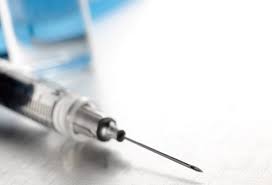Needle Phobia
Approximately 10% of the population has needle phobia, or an intense fear of needles and sharp objects.
Using topical anesthetics may reduce the pain and related anxiety caused by needle phobia
Introduction to Needle Phobia
Fear of needles is a “specific phobia.” The Diagnostic and Statistical Manual (DSM-IV) lists a specific phobia as “marked and persistent fear that is excessive or unreasonable, cued by the presence or anticipation of a specific object or situation (e.g. flying, heights, animals, receiving an injection, seeing blood)”
There are several different phobias which fear of needles can fall under:
Belonephobia: fear of needles
Aichmophobia: fear of pointed objects
Trypanophobia: fear of injections
No matter what the name, however, needle phobia can cause problems when people avoid receiving medical care because of their fear. Today, the diagnostic process as well as preventive medicine regularly includes both injections and blood testing, both that require needles.
One common symptom of needle phobia is vasovagal reflex (fainting and possible loss of consciousness), tachycardia (rapid heart rate or heart palpitations) or hypertension (high blood pressure), even at the thought of having an injection or blood testing.
Needle phobia is a medical condition that deserves treatment as much as any other medical condition. You should not be any more ashamed of have this condition as you would a headache, heartburn, back ache or other form of anxiety. Whether your specific needle phobia is biological or psychological in nature, or both, in medical journals it is still called needle phobia. It even has an ICD-10 medical insurance billing code attached to it.
The medical profession pays inadequate attention to needle phobia, in part, because those with needle phobia tend to avoid contact with the medical profession. Few physicians have any idea about the magnitude of this problem. Many people would rather die than have a needle procedure, and countless thousands of people actually do die for that reason. For a physician to tell someone with needle phobia to “Just get over it!” or to “Just grow up!” is equivalent to beating a headache patient over the head with a rubber mallet. It is certainly not going to make the situation any better, and it is likely to make it very much worse, possibly with results that could later become life-threatening.
Trypanophobia is a condition, formally recognized in the Diagnostic and Statistical Manual of Mental Disorders, affecting approximately 50 million Americans, making it a top-ten American fear.1 People who suffer from this often debilitating condition can experience symptoms including hypertension, rapid heart rate or heart palpitations followed by hypotension/bradycardia and even fainting or loss of consciousness.2 These physical manifestations of the phobia can also trigger feelings of anxiety and hostility toward the medical profession as a whole.

Not only are the symptoms themselves harmful to the individual’s health, but the fear associated with doctors, nurses and other medical professionals often prevents people from seeking treatment for serious ailments. Of those suffering from needle phobia, it has been reported that at least 20% avoid any medical treatment as a result.1 In a 2012 survey conducted by Target and Harris Interactive, out of the 60% of American adults who chose not to receive a flu vaccination, 23% stated the reason is a fear of needles. 3
According to the Centers for Disease Control and Prevention, each year as much as 20% of Americans fall victim to influenza and flu-related complications, resulting in approximately 200,000 hospitalizations and 36,000 deaths. 4 However, even in the face of such overwhelming statistics, sufferers of needle phobia will abstain from the flu vaccination.
What are the symptoms of needle phobia?

NeuroMed 7 Topical Skin Numbing Cream can help ease the pain caused by needle injections: BUY NEUROMED 7 ONLINE
The specific symptoms induced by needle phobia are directly related to its underlying cause, making it rather straightforward to identify the actual source and treat it.
1. Fainting. People who suffer from severe dizziness or fainting in response to needles typically have vasovagal reflex reaction, which often runs in the family.
2. Bad Memories or Ruminations. People who experience emotional reactions such as anxiety, insomnia, and panic attacks are suffering from emotions provoked by prior experiences (or imaginings). Their fears can be activated at any time, and they often have other medically-related fears as well.
3. Pain Intensity. Some people have a genetic condition that makes them extremely sensitive to pain. They cannot understand how other people can so bravely tolerate the enormous physical pain of a shot. They react to the pain with high anxiety, blood pressure and/or high heart rate, at some time during the procedure.
4. Fear of Being Restrained. People with this variety of needle phobia are actually afraid of being held down or controlled (restrained), even though they may think the needle itself is the actual issue. They typically develop a high heart rate, and may become physically or emotionally violent or may even try to run away.
5. Empathetic. Watching someone else receive a shot or medical care precipitates one of the above reactions.
Courtesy of Sclero.org (http://www.sclero.org/support/emotional-adj/needle-phobia/a-to-z.html)
What happens during needle phobia anxiety episodes?
• Feel intense fear and distress
• Increased heart rate and blood pressure (Willemsen, 2002)
• Sudden reflexive high drop in heart rate and blood pressure (Willemsen, 2002)

After the heart rate and blood pressure increases, the body then reacts by trying to reverse by slowing down. This reflex is called the vaso-vagal reflex, which causes the heart to slow down and blood pressure to drop. Sometimes this reflex is so pronounced that it causes fainting. (Willemsen, 2002).
Ways to handle the vaso-vagal reflex:
• Have the person (or yourself) lie down when getting an injection, IV, or blood test
• Apply a desensitizing agent (“numbing cream” or topical anesthetic cream), such as EMLA, LMX 4 or NeuroMed7 to the treatment area prior to the needle stick or IV insertion.
• Have the person continue to stay lying down for a few minutes after the needle, and get up very slowly
• Have the person (or yourself) tighten the muscles in the arm, legs and body, while relaxing the needle treatment arm.
Needle Phobia Related Anger and Hostility Feelings Toward the Medical Profession
If you have developed hostility and anger toward the medical profession as a result of needle phobia, you may find it very useful to have several sessions consulting with a psychiatrist. A psychiatrist is a medical doctor who is trained to discuss and to help you to understand and possibly overcome these types of problems. Considering the brutal way that many very young children are treated during needle procedures, it is not surprising that many people develop this fear, which in turn, can lead to hostility. Someday, though, you are likely to reach a point where your health, and possibly your life, depends upon these medical professionals. So if you feel this hostility, please take steps to overcome it before you develop a serious medical problem where you desperately need medical professionals. it is important that you learn to deal with medical professionals assertively, while not being hostile or aggressive.
Skin Numbing Cream Product Information
NeuroMed 7 Topical Skin Numbing Cream can help ease the pain caused by needle injections: BUY NEUROMED 7 ONLINE
- “Needle phobia facts.” Big Shots Get Shots. Healthline, n.d. Web.
- “Needle phobia.” Healthcentral.com. HealthCentral, n.d. Web.
- Target Corp. Target Survey Shows Adult Americans May Avoid the Flu Shot Due to Fear of Needles. BusinessWire.com. BusinessWire, 14 Aug. 2012. Web.
- “Seasonal Influenza.” Centers for Disease Control and Prevention. Centers for Disease Control and Prevention, 20 Sept. 2013. Web.
- Emanuelson, Jerry. “A starting point for overcoming an important, but often ignored condition.” The Needle Phobia Page. N.p., 1997. Web.
Do not use this information in place of the advice of a licensed healthcare professional (doctor). This information is not intended to be used to diagnose or treat a condition. Seek professional medical assistance if you suffer from this condition.


